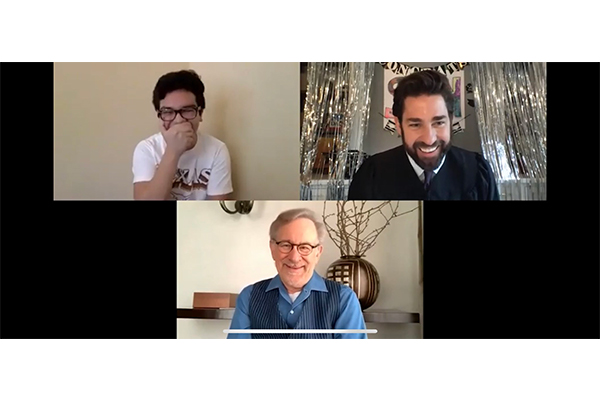With days left before his virtual graduation, an aspiring UT screenwriter received personal advice from a Hollywood legend.
After the Twitter account for John Krasinski’s (“The Office,” “A Quiet Place”) YouTube show “Some Good News” asked graduating students to record their own personal commencement speech, theatre studies senior Ben Montero was quick to submit his own video. Shortly after, a direct message from “Some Good News” placed Montero in the middle of a private Zoom call with Krasinski and legendary filmmaker Steven Spielberg.
DT: What did you talk about with Krasinski that didn’t end up in the episode?
BM: Me and John did exchange some “Hook ’em Horns” together, which I was hoping would make it in, but I was so sad that it didn't. I actually told (him) this (was not) the first time that we met. I actually got to meet (Krasinski) at South by Southwest in 2018. I asked (him) a question during the Q&A session (for “A Quiet Place”), and I made it seem like I hated the movie. I finally got to tell (him) that I'm sorry. He started laughing and was like, “You're all good.”
DT: What was it like speaking to Steven Spielberg?
BM: (John) asked me, “What's your favorite Spielberg movie?” right in front of Mr. Spielberg. And then on a whim I said “ET” because I do love that movie. And then (Spielberg) went on a little bit just talking about what “ET” meant to him. After the call I cried for like a good 30 minutes and I rewatched "ET" and then cried even more. I want to go (in) to teaching, and that's what I got my degree in. (But) since I was little I had these little aspirations for film, and right now I'm really into screenwriting. Just having this affirmation from (Krasinski and Spielberg), the validation about those dreams, (it) really did spark something in me.
DT: What is your advice to filmmakers/screenwriters stuck in quarantine?
BM: Jordan Peele says to follow the fun (when writing). So I'm trying to follow the fun wherever it's at and see wherever it goes creatively. Taylor Sheridan (“Hell or High Water”) talks about writing like a theme. He’ll write however much he wants to write, and then once he starts writing (the next time) he goes back to page one and starts editing from there. Then (he) carries on for the rest of the screenplay. I think that's particularly fascinating as well because (that) can get you thinking a bit more ahead within the story that you're writing.




















